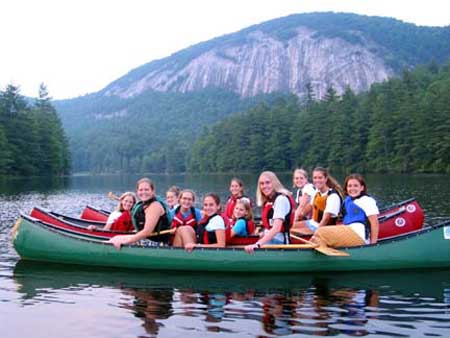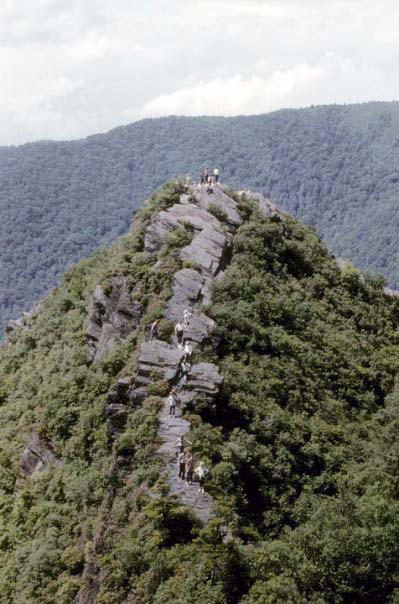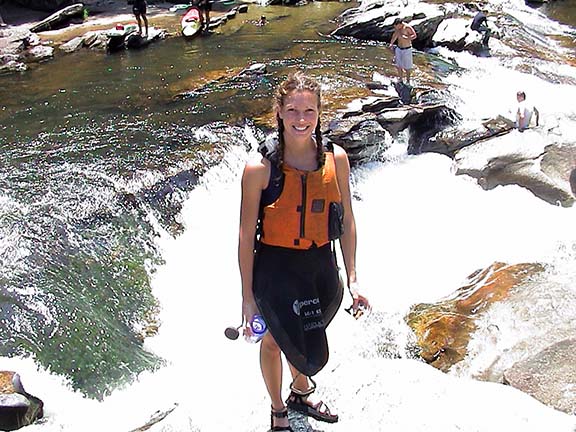O k, I admit it(proudly). I am one of those “camp kids” that has about ten million stories that start with, “This one time at camp…”
k, I admit it(proudly). I am one of those “camp kids” that has about ten million stories that start with, “This one time at camp…”
I was fortunate enough growing up to spend my summers at Camp Merrie-Woode (the most beautiful place on earth), an all-girls summer camp, nestled in the mountains of North Carolina. I went for six weeks every summer from ages 7 to 17, and was a counselor for 12 weeks every summer for three years.
Somehow, at 31, I still think about camp every day. It is, I think, the most defining and molding thing in my life. I carry not only wonderful memories with me every day, but also what I consider to be critically important life lessons.
Some of the most important lessons I learned revolve around risk, success, and failure. These lessons have served me well over the years and have helped me make decisions and take actions that have gotten me where I am today – especially in the business world.
You don’t see big rewards without taking big risks.
 This is probably the biggest lesson I learned. Merrie-Woode’s Outdoor Adventure Coordinator, JP Bevilaqua, wrote a great post that interprets the quote “Success without the legitimate potential for failure is not legitimate.” In this post he discusses the lessons one learns from adventure and taking risks.
This is probably the biggest lesson I learned. Merrie-Woode’s Outdoor Adventure Coordinator, JP Bevilaqua, wrote a great post that interprets the quote “Success without the legitimate potential for failure is not legitimate.” In this post he discusses the lessons one learns from adventure and taking risks.
Like JP discusses, camp is all about pushing you out of your comfort zone. For me, that meant pursuing lots and lots of outdoor activities: whitewater canoeing and kayaking, rock climbing, wilderness backpacking trips, and high-ropes courses. At the time, I thought I was just having fun. Looking back, I can see that I was learning so many lessons about risk, success, and failure.
Risks are scary; that’s why they are called risks.
 I distinctly remember the first time I learned how to surf a rapid in my kayak. Granted, the rapid I learned on was way smaller than the one in this video, but by the age of 15, I was surfing in rapids just like this one. Before I paddled out to the rapid, I was petrified…With my white knuckle grip on the paddle, I was sure that I was going to get in the rapid, flip, and swim.
I distinctly remember the first time I learned how to surf a rapid in my kayak. Granted, the rapid I learned on was way smaller than the one in this video, but by the age of 15, I was surfing in rapids just like this one. Before I paddled out to the rapid, I was petrified…With my white knuckle grip on the paddle, I was sure that I was going to get in the rapid, flip, and swim.
Much to my surprise, I didn’t, and from then on I was hooked. After that, I lived for river trips. Any time I was fearful (which happened often), I threw myself in head-first and tried it.
That’s not to say I didn’t end up swimming on occasion; I even got a mouth-full of paper-mill water on the Pigeon one time (delicious). But I still loved it. I just analyzed what I did wrong and tried not to do it again.
Fast forward to when I was a counselor and I saw the same light-bulb turn on for one of my campers. To this day, that is one of my proudest moments – I think I teared up when she paddled over to me, beaming.
Risk is a powerful teacher.
What did I learn from moments like this? Where do I begin?
1. Just because it’s scary, doesn’t mean it’s bad. Allow the fear to focus you.
It’s easy to freeze – to let the “what if” scenarios play out in your mind until you chicken out. True, those things may happen, but they may not as well. Think it through, and if it makes sense, channel that fear into laser focus.
Pitching to a new client? Speaking at a conference for the first time? Implementing a big change? Visualize what you want the result to be. Think about how you will get there and then dive in.
2. Sometimes, the risk is not worth the potential reward; it’s smartest to take calculated risks (failure taught me this lesson).
Notice that above I said, “Think it through.” I didn’t say, “Jump in without knowing a) how deep the water is, or b) are there rocks down there?” There are times where yes, the payoff could be huge, but the potential downsides could also be monumental.
At times like this, it’s helpful to gather some collective intelligence. At LockNet, managers rarely make really big decisions without first discussing it with the entire management team. For example, moving to a new warehouse is something we have been discussing for years. We finally knew the time was right and the risk is paying off.
3. Just because you fail, doesn’t mean that a) you’re a failure, or b) you will always fail.
When rock climbing, I could climb the same route ten times, and five of those I would fall. Moral of the story? Just because you failed once, doesn’t mean you are going to fail again. The trick is not getting discouraged by failure.
If you are trying something new at work, know that it may take a few tries. You may have to work a few different angles to be successful and that’s ok. Just because your approach was wrong doesn’t mean the goal is wrong.
4. You learn just as much from failure as you do from success. Put on those rose-colored glasses!
Part of not getting discouraged is learning from each failure. Sometimes it may feel like you have to look really hard but, trust me, the lesson is there.
At LockNet, a lot of our policies and procedures have stemmed from failures. We learned what we did wrong and implemented processes to make sure it didn’t happen again. Each failure will open your eyes and give you a new perspective.
5. Sometimes the outcome of taking a risk will far exceed your wildest expectations.
This single fact alone often times gives me the courage I need to take big risks. True, at times the outcome will be just what you had imagined, but there are times where you will surprise yourself.
Launching a new business line, making that career change, making that financial investment – they are all huge risks. It’s hard to have any real idea of what the outcome will be. These leaps of faith can be the very things that propel you and/or your company into greatness. And trust me; it’s pretty special when it happens.
Yes risk is hard. And yes, you will fail, but you will also succeed. There are so many moments at work where we need to venture into the unknown. Sometimes the unknown is something small and sometimes it is large. What that unknown is will be different for each of us, but I promise you, if you go there, you will grow. You will not always be successful, but you will be a better business person for it.
What are some of the biggest risks you’ve taken in life? What have you learned from them? We’d love to hear about it in the comments!
